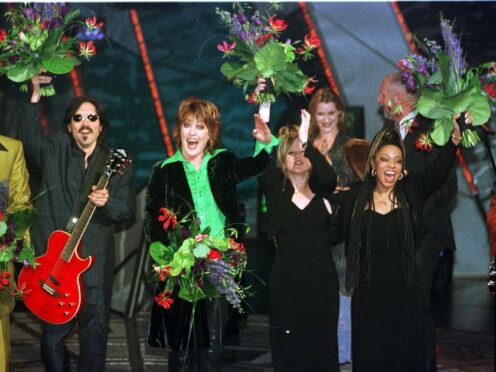The UK has won the Eurovision Song Contest a total of five times having first entered the competition in 1957.
Despite perceptions of having a chequered history in the competition, entrants from the UK have come in second in the final 16 times, a record in the contest.
The country is also just behind Sweden and Ireland, who jointly have the most Eurovision wins with seven each.
Here is a round-up of those winning UK moments:
– First win takes 10 years
After five second-place finishes, the UK won its first Eurovision song contest in 1967 with bare-foot Sandie Shaw’s Puppet On A String and after that the decade brought forth more success for the country.
Shaw was awarded points from all the countries except for Spain and Yugoslavia and released a new version of her song last year for charity.
– Lulu makes a bang
In 1969, Lulu represented Britain at the Eurovision Song Contest with the song Boom Bang-A-Bang.
She became the first tied winner alongside the French, Spanish and Dutch entries, who were all on 18 points each.
The previous year Cliff Richard came second at 1968’s Eurovision, the first broadcast in colour, after his song Congratulations came second to Spain’s entry, La, La, La by Massiel.
He tried to avenge his defeat by competing in the 1973 contest with the song Power To All Our Friends and came third.
– Popular winner
The 1970s saw a return to form for the UK as Brotherhood Of Man’s song Save Your Kisses For Me won the contest, and also topped the chart in 1976.
The band’s manager Tony Hiller put the song’s success down to their TV appearances across France, Belgium, Germany and Switzerland the year before the contest and the record sold six million copies, one of the best performing of recent years.
– A skirt-ripping dance routine
Bucks Fizz also had a number one in the UK charts along with winning the 1981 competition with the upbeat Making Your Mind Up which featured a famous costume trick.
The dance routine saw the male singers take off the female musicians skirts, revealing another one underneath, during the performance.
– Katrina and The Waves wins
By the 1990s for the UK Michael Ball’s One Step Out Of Time and Sonia’s Better The Devil You Know had both finished second and the UK seemed out of luck.
However, the Katrina and The Waves’ song Love Shine A Light won in Dublin in 1997, causing Britons to dream once more that this contest was theirs for the taking.
Shortly afterwards, Imaani came second in 1998 with Where Are You? and Jessica Garlick achieved third place with Come Back in 2002.
– A reversal of fortune
Dismay for fans followed in 2003, when Cry Baby by Jemini became the first UK song in Eurovision history that failed to score with group blaming their struggling performance and subsequent ‘nul points’ on audio problems.
The 2000s and 2010s were similarly two woeful decades, with Andy Abraham, Josh Dubovie, Michael Rice and James Newman coming dead last from 2008 to 2019.
– Sam Ryder soars into space
Though high-profile stars including Bonnie Tyler with Believe In Me in 2013, Engelbert Humperdinck with Love Will Set You Free in 2012 and Blue with I Can in 2011 took part there was no top five winner since Jade Ewen’s It’s My Time in 2009 until 2022’s Sam Ryder.
Ryder entered with his uplifting pop song Space Man, taking second place in the competition in Turin, Italy.
The 34-year-old TikTok star topped the national jury vote with 283 points, beating favourites Spain and Sweden, but it was ultimately Ukrainian rap folk band Kalush Orchestra who took the trophy.
Fortunes were revived and the UK hosted in Liverpool for Ukraine in 2023, but Mae Muller’s playful performance of her track, I Wrote A Song, came second last.
This year, there are high hopes for Olly Alexander’s catchy discoesque track Dizzy.
